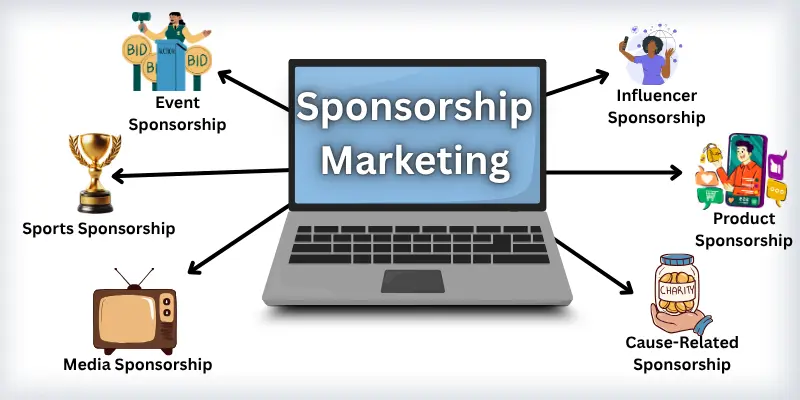What is sponsorship marketing? Types, Examples & Benefits Explained
Published: 07 Oct 2025
From sports stadiums to social media influencers, brands are everywhere, but have you noticed how they appear at just the right places? This is known as sponsorship marketing, a clever way for businesses to connect with their audience, create memorable experiences, and expand their brand influence. Just like other types of digital marketing, it helps brands reach people in creative and meaningful ways.

What is sponsorship marketing?
Sponsorship marketing is a strategy where brands support events, teams, or influencers to promote their products or services. It helps companies reach their target audience in a natural and engaging way. Unlike traditional advertising, sponsorship marketing focuses on building positive associations with the brand. Companies use it to increase visibility, trust, and customer loyalty. Overall, it is a powerful tool for growing a brand and creating lasting connections with consumers.
Types of sponsorship marketing
There are various ways brands can engage in sponsorship marketing. Each type helps reach the audience in a unique way.
Types:
- Event Sponsorship: Brands support events like sports, concerts, or fairs.
- Influencer Sponsorship: Brands work with social media stars or bloggers.
- Cause-Related Sponsorship: Brands support charities or social causes.
- Media Sponsorship: Brands sponsor TV shows, radio, or online media.
- Product Sponsorship: Brands give their products to events or personalities.
Sponsorship Marketing Examples
Many brands use sponsorship marketing to connect with their audience. Here are some popular examples:
- Coca-Cola is sponsoring the FIFA World Cup
- Red Bull sponsors extreme sports events
- Nike sponsoring athletes
- Pepsi is sponsoring music concerts
- Adidas is sponsoring football clubs
- Apple is sponsoring tech events
1. Coca-Cola is sponsoring the FIFA World Cup
Coca-Cola sponsors the FIFA World Cup to reach football fans worldwide. They place their logo on stadiums and ads. They also run campaigns during matches. This helps them connect with millions of viewers.
2. Red Bull sponsors extreme sports events
Red Bull sponsors extreme sports like skydiving and snowboarding. They create exciting videos and events for fans. This shows their brand as adventurous and bold. People remember Red Bull because of these thrilling activities.
3. Nike sponsoring athletes
Nike sponsors famous athletes, such as Cristiano Ronaldo. They provide sports gear and feature it in ads. This helps Nike appear as a top sports brand. Fans trust Nike because of their favourite athletes.
4. Pepsi is sponsoring music concerts
Pepsi sponsors big music concerts and festivals. They set up stages, booths, and promotional campaigns. Fans enjoy music while noticing Pepsi everywhere. This builds brand awareness and loyalty.
5. Adidas is sponsoring football clubs
Adidas sponsors football clubs, such as Real Madrid. They provide kits, shoes, and accessories for players. Fans see Adidas gear in matches and ads. This strengthens Adidas’ image as a sports brand.
6. Apple is sponsoring tech events
Apple sponsors tech events and conferences. They showcase products and innovations. Attendees get hands-on experience with Apple products. This improves their brand reputation and attracts new customers.
Sponsorship Marketing Agency
A sponsorship marketing agency helps brands plan and manage their sponsorship campaigns. They connect companies with the right events, influencers, or causes. Agencies make sure the sponsorship reaches the right audience and gives good results.
What They Do:
- Find the Right Partner: They match brands with events, influencers, or teams.
- Plan Campaigns: Agencies create strategies that meet the brand’s goals.
- Manage Promotions: They handle ads, content, and event visibility.
- Track Results: Agencies measure how successful the sponsorship is.
Why Brands Hire Them:
Brands hire sponsorship marketing agencies to save time and get better results. Agencies have experience, contacts, and tools to make campaigns effective. They also help avoid mistakes and improve ROI.
Advantages and Disadvantages of Sponsorship Marketing
Sponsorship marketing has both benefits and drawbacks. It can help brands grow and reach their audience, but it also comes with some challenges. Here’s a simple list for beginners:
| Advantages |
|---|
|
| Disadvantages |
|---|
|
Conclusion
So, friends, it’s time to wrap up! We have covered Sponsorship Marketing in detail. From understanding its meaning to exploring examples and benefits, we saw how it helps brands grow. I personally recommend that businesses consider sponsorship marketing to reach their audience in a fun and engaging way. If you want your brand to stand out, start planning your sponsorship campaigns today!
Common Questions about Sponsorship Marketing
Yes, small businesses can sponsor local events or micro-influencers. It helps them reach their audience without spending too much. Even small sponsorships can build trust and visibility.
The cost depends on the event, influencer, or cause. Big events are expensive, while smaller partnerships are affordable. Brands should plan according to their budget and goals.
Advertising directly promotes products or services. Sponsorship builds brand awareness and trust by supporting something else. Sponsorship feels more natural to the audience.
Look for influencers who share your brand values. Check if their audience matches your target customers. Their style and engagement should fit your marketing goals.
Yes, tools like social media analytics, website traffic monitors, and engagement metrics help. They show how many people saw or interacted with your sponsorship. This helps improve future campaigns.

- Be Respectful
- Stay Relevant
- Stay Positive
- True Feedback
- Encourage Discussion
- Avoid Spamming
- No Fake News
- Don't Copy-Paste
- No Personal Attacks

- Be Respectful
- Stay Relevant
- Stay Positive
- True Feedback
- Encourage Discussion
- Avoid Spamming
- No Fake News
- Don't Copy-Paste
- No Personal Attacks
